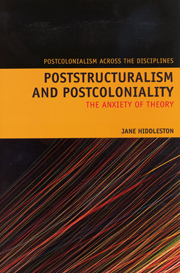Conclusion
Summary
This study began with acknowledgement of the problems associated with the use of poststructuralism in postcolonial thought, and it should be recognised that the sorts of writing discussed here have been seen as part of the very demise of poststructuralist theory itself. Indeed, a number of commentators in recent years have pronounced theory of this sort to be dead, and it is in this context of threatened extinction that the poststructuralist postcolonial thinkers explored here exhibit their own specific forms of anxiety. Certainly, many of the great French thinkers associated with poststructuralism and with the forms of cultural and political questioning that exploded around May 1968 have passed away, and a new generation has not yet produced a similarly creative, innovative and influential movement to take the place of their achievements. It is also significant that the last decade or so has seen an abundance of works published referring to the demise of the genre and raising the question of its potential successor. Terry Eagleton's After Theory (2003) echoes Thomas Docherty's study of postmodernism and postmarxism also titled After Theory (1990), and Colin Davis's After Poststructuralism (2004) raises the question of theory's fragile livingon in the light of frequent assertions of its extinction. Two separate collections of essays edited by Martin McQuillan et al. and by David Bordwell and Noël Carroll share the title Post-theory (1990 and 1996), while Judith Butler, John Guillory and Thomas Kendall have produced a volume under the punning heading of What's Left of Theory? (2000).
- Type
- Chapter
- Information
- Poststructuralism and PostcolonialityThe Anxiety of Theory, pp. 175 - 185Publisher: Liverpool University PressPrint publication year: 2010

